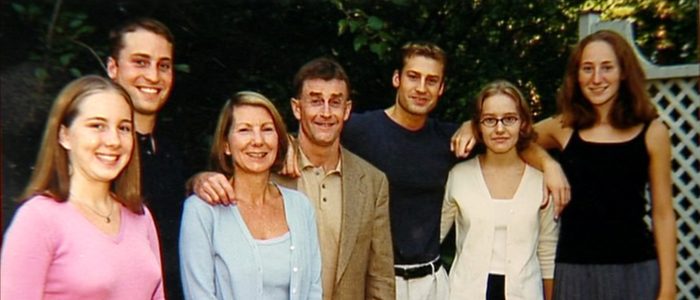'The Staircase' Review: Netflix Makes An Old True Crime Doc New Again
What Happened to Kathleen Peterson?
On December 9, 2001, Kathleen Peterson met a gruesome end. That is the sole fact in this story – something that can't be disputed, argued about, or theorized over. She died in not just a pool, but a veritable river of her own blood at the bottom of a staircase in the home she shared with her husband, author Michael Peterson.Everything that followed, however, is up for debate. And despite the 13-some-hours of The Staircase, Jean-Xavier de Lestrade's hypnotic documentary series revived by Netflix, we'll never know what really happened. It's a mystery, and it will always be a mystery. Human beings are inherently drawn to mysteries – there's the allure of being clued-in to something mysterious, and unknown. And there's the allure of possibly solving the matter; of arriving at a definitive conclusion that others had failed to notice.Anyone looking for some sort of closure, or definitive answer, need not bother to watch The Staircase. That's not the type of true crime documentary this is. Rather, this is a film that focus on the mundanity of a murder trial – the long waiting periods, the drudgery of preparation, the uneasy waiting for something, anything, to happen. It's a fascinating film that stands apart from most modern true crime docs, and might catch some viewers off guard as a result.Lestrade's film was originally released in 2004. True crime documentaries are nothing new, but they've reached a tipping point. Netflix and others have turned true crime docs into a sub-genre unto themselves. As a result, modern true crime docs all seem to share the same tropes: sweeping drone-filmed shots of bleak, barren landscapes; dramatic recreations; talking-head interviews; inserts of newspaper headlines.The Staircase doesn't traffic in these things. Aside from the talking-head interviews, The Staircase doesn't feel like your standard true crime doc. Instead, it feels like a voyeuristic peek into the life of Michael Peterson and his family.Lestrade and his crew were embedded with Michael Peterson, his lawyers, and his family, for years. They covered the beginning of the story – when Peterson became a suspect in his wife's death – to the seeming end of the story – when Peterson was found guilty and sentenced to life in prison without the possibility of parole.But the story didn't end there. It would continue on, with surprising results. Now, years later, Lestrade has put together three new episodes of The Staircase that bring the story to as conclusive an end as possible. It's not neat and tidy, and questions still linger. Yet when the credits roll on the final episode, it finally feels as if we've reached the only possible end of this story.So what, exactly, happened to Kathleen Peterson? Prosecutors, and two of Kathleen's sisters, contended that Michael Peterson murdered her. In the course of the investigation, it was revealed that Michael Peterson was bisexual, and that he had carried on affairs with men. In the eyes of Kathleen's sisters – and the prosecutor's office – this was all the proof they needed. They theorized that Kathleen learned of Michael's secret life, they quarreled, and he killed her.However, Michael contended that Kathleen knew about his sexuality, accepted it, and that they had an open marriage. This is an entirely plausible explanation, but to the prosecutors in North Carolina, where the event took place and was tried, it almost seems like science fiction. In the American south in the early 2000s, the idea of an "open marriage" comes across as blasphemy. There's a moment in The Staircase where members of the prosecution are forced to say the word "bisexual" when referring to Peterson, and it becomes painfully clear that this is probably the first time any of these individuals have had to say the word out loud.To be blunt, the idea seems aberrant to many of these people. So much so that in her closing statements in the trial, Assistant District Attorney Freda Black makes a huge deal about Michael's sexuality and his cache of homosexual pornography, going so far as to describe the pornography as material so shocking that she can't even say it out loud. No matter what you think of Michael Peterson's guilt, there's an unmistakable sense that the prosecution is convinced he's guilty simply because of his sexual preferences, and that's unsettling. Hell, it's beyond unsettling – it's terrifying.And yet, the question remains. What happened to Kathleen Peterson?
The Original Staircase
Jean-Xavier de Lestrade began filming The Staircase soon after Michael Peterson's indictment. Many true crime docs are made after the fact, with filmmakers looking back on something in the past. The Staircase, however, treats viewers to an as-it-happened narrative. We're there seemingly every step of the way.The key thing to remember here: The Staircase is told almost entirely from Michael Peterson's point-of-view. While members of the prosecution pop-up for an interview or two, the bulk of The Staircase features team Peterson. Lestrade sets up shop in the Peterson home, and follows Peterson and his many children as they deal with the fall-out.The Peterson clan was like a modern-day Brady Bunch, assembled from other families. Peterson had kids from a previous marriage, as did Kathleen. Peterson also adopted two girls, Margaret and Martha – originally children of a family friend who died. More on that later.After the arrest, the bulk of Peterson's kids, including Margaret and Martha, stuck with him, insisting on his innocence. Peterson hired a defense team, lead by the very affable David Rudolf, who is more or less the second main character of this saga next to Peterson. As the trial unfolds in The Staircase, it becomes clear that Rudolf believes firmly in the innocence of his client, and is convinced the justice system is failing him.But is that all for show? When watching The Staircase, you can't help but think of the Heisenberg Uncertainty Principle – the fact that when you look at something (or point a camera at it) for the purposes of studying, you inadvertently change the thing you're looking at. This is perhaps the biggest flaw of The Staircase – it's hard to tell what is genuine, and what is being dramatized by people who may not even realize they're dramatizing things. When a camera is pointed at you, sometimes you inadvertently begin to act a different way than normal.Peterson and the people around him are very aware of the camera crew, too. At one point, when a potential bombshell arrives in the case, Rudolf turns to the camera and quips, "Your movie just got a lot better."Since the bulk of The Staircase is told from Michael Peterson's point-of-view, it becomes very easy to believe that he might be innocent. He seems incapable of the crime – but perception can't really be counted on in this sort of situation. There were plenty of people who thought Ted Bundy was a nice, normal guy, too.Still, as we watch Peterson's kids stick by him, and as we watch Rudolf grow more and more indignant that the trial doesn't seem to be going the way it should, it truly does seem as if Peterson might be innocent and getting the short end of the stick.And yet...questions remain. We're presented with grisly crime scene photos and videos showing Kathleen Peterson's dead body, and they're shocking to the extreme. The first thing that jumps out from these visual is the blood – there's a lot of it. Almost too much blood. We're talking horror movie blood spray here, to the point where almost all we can see is the dried, faded crimson of all that spilled blood. To a layman (i.e., your average viewer), this seems like far too much blood for a simple fall down the stairs.The prosecution contends that Peterson actually beat his wife to death with a fireplace blow poke. The blow poke from the Peterson fireplace is mysteriously missing, although we later find out that it wasn't missing at all – it was in the Peterson garage. And that when tested, there was no sign that the blow poke was used in the crime.Another shocking reveal comes when we learn that Margaret and Martha's real mother also died on a staircase, 17 years prior to Kathleen's death. Her body was found at the bottom of a staircase in her house in Germany. At the time, Peterson and his first wife were also living in Germany, right next door. Even though this death was ruled to be caused by a cerebral hemorrhage, the prosecution introduces it into the trial as if to suggest Peterson has done this sort of thing before.Bringing up this death in the trial might seem to make sense at first, but in one scene, Rudolf highlights the strangeness of this by wondering if the prosecution is trying to imply that Peterson is "the Staircase Killer – he strikes every 17 years, and always finds a way to kill a woman on a staircase."As the original Staircase unfolds, it becomes unlike most modern-day true crime docs. Yes, there are shocking moments, but they don't play out as big cliffhangers the way something from Netflix's Making A Murderer might. The Staircase is much more mundane – we watch as Peterson waits, and waits, and waits. As he smokes a pipe in his study, as he and his kids gather for a joke-filled dinner, as he and his lawyers go over paperwork.This may not sound particularly exciting, but it's surprisingly engrossing. We're drawn into a world that most other true crime docs ignore – a private, everyday world. The mystery of court trials is stripped away as well – Lestrade effectively captures how tedious being a courtroom can be.In one memorable scene, we watch Rudolf the night before the trail begins, attempting to go over the slideshow he wants to accompany his opening statement. It's like watching the rehearsal of a play, and it grows amusing as Rudolf becomes furious with the computer tech running the slideshow, who is unable to give Rudolf exactly what we want. If this is like watching a rehearsal of a play, the computer tech is a mediocre stage hand, constantly missing his cues.For most of The Staircase's length, it truly seems that Peterson will be found innocent. In murder trials, the defense doesn't have to prove innocence, they just need to instill reasonable doubt. If there's even the slightest chance a plaintiff might be innocent, the jury is supposed to acquit. And there's plenty of reasonable doubt in the Peterson case.But it doesn't matter. Peterson is found guilty, and sentenced to life without parole. If The Staircase was brand new, this would be the end of the story. But because the bulk of this series was shot 14 years ago, the story goes on.In 2013, Lestrade released an update on The Staircase. In the years since the original series' end, Michael Peterson has been in prison. But new details come to light. Duane Deaver, a blood splatter analyst who testified at Peterson's trial, and whose statements were cited by one juror as the reason for the guilty verdict, came under fire when it was revealed he withheld evidence in another trail.An investigation was launched, and it came to light that Deaver had lied or withheld evidence in several trails, including Peterson's. Because of this, Peterson and his lawyers were able to convince a judge – the same judge that served Peterson his original conviction, in fact – to order a new trail, and have Peterson released on house arrest. And here is where the Staircase of the past ends, with the audience left wondering what will become of Michael Peterson. It's hard to imagine a modern-day true crime doc ending like this – leaving the viewers with literally no sense of closure or completion.
The Netflix Staircase
I was expecting the Netflix update on The Staircase to be different than the original. I thought that perhaps Netflix would require Lestrade and company to update the style of the show to better fit in with the other Netflix true crime docs. But aside from improved video quality, the three new Netflix Staircase episodes look and feel almost identical to the original series.
The Netflix episodes pick up in 2014. Peterson is now 71 years old, and wary over the prospect of the new trial. He's also an old man now, and it's clear a weariness has set in. All he wants is for this to be over. So he can take a chance – he can accept an Alford Plea, which more or less means he's admitting his guilt without saying he's guilty, and go free; or he can go to trial again, and risk losing.
These three episodes are devoted to Peterson and his lawyers trying to decide the best course of action. But they also offer new insight into Peterson as a person. While Peterson's bisexuality was a topic mentioned in the original Staircase, Peterson himself never addressed it directly. Here, in this new footage, Peterson sits down for a one-on-one interview with the filmmakers, and speaks about his sexuality. It's a revealing segment, and makes Peterson seem even more sympathetic in the process. It's a moment of clarity that stands out above nearly every other moment of this lengthy docu-series.
If there's a theme to these three new episodes, it's that time marches on, no matter what. So much has changed from the original Staircase. new bits of information have come to light, and it's become even more apparent that Peterson likely didn't receive a fair trial. And yet despite all this, his options are limited, and his age is showing. He looks more worn-down in these episodes; more defeated.
The Netflix episodes also directly address the one-sided nature of the storytelling here, via an unexpected source. Candace Zamperini, one of Kathleen Peterson's sisters who is 100% convinced of Michael Peterson's guilt, stands up in a court scene and delivers a scathing rebuke of Peterson. In the process, she also calls out the documentary crew, underlining the fact that she didn't agree to the making of the film, and that by being so close to Michael Peterson, the doc tells only his side of the story. It's an uncomfortable scene, but Lestrade, to his credit, leaves it intact.
Through it all, the mystery remains. Did Michael Peterson kill Kathleen Peterson, or was it a tragic accident? "We all want to know how the mystery ends," lawyer David Rudolf says to the camera. But even as The Staircase draws to a close, and we're left with a semblance of closure, the mystery remains. It lingers, like the smell of sulfur in the air after you strike a match. Peterson himself sums it all up succinctly. "There is no closure," says the man once convicted of murdering his wife. "This is not an end."
***
The Staircase arrives on Netflix on June 8, 2018.

